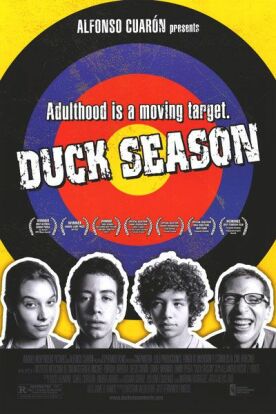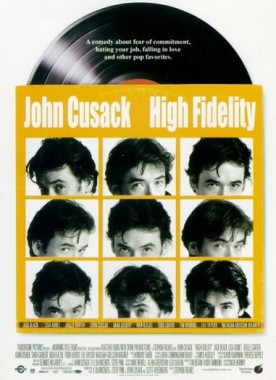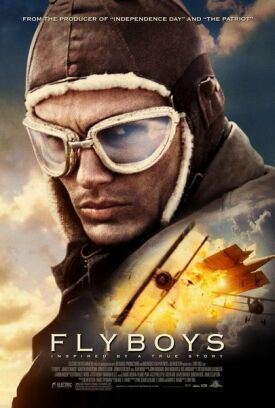Duck Season (Temporada de Patos)
The best film I’ve seen so far this year is Duck Season (Temporada de Patos) by Fernando Eimbcke. At 36, Sr. Eimbcke is an almost exact contemporary of Carlos Reygadas, whose Battle in Heaven so annoyed me a few weeks ago, but he has none of his fellow Mexican’s artsy pretentiousness or self-conscious “daring.” Instead, he is content to tell a very simple story on a very small scale — and in black-and-white — and so achieves a level of artistic accomplishment that eludes his compatriot.
Juan Pablo, known as Moko (Diego Cataño) and Mario, known as Flama (Daniel Miranda), are 14 year-old best friends who are spending a long Sunday alone together in Flama’s parents’ apartment. The apartment building is called Niños Heros — heroic children. Flama’s mother (Carolina Politi) is just on her way out the door as the story gets underway, and she fusses about whether she has left the stove, or the coffee-maker on, returning to the apartment twice before finally disappearing. When she does, the camera remains focused on the apartment door for some time until we see it open a crack and the boys’ peeking out to find her gone. The door closes again, the door shot is re-established, and from inside the apartment we hear a muted cheer.
Their project for the day appears to be to be nothing but playing a violent video game which pits George Bush against Osama bin Laden. The boys quarrel over who gets to be Bin Laden. But before they have been playing very long, the power goes out and they are left to amuse themselves as best they can until it comes on again. Even at this early stage, as our Niños Heros pit themselves against each other in the game and then together against boredom, we begin to get a sense of Sr Eimbcke’s compassion towards the boys. There is comedy in their assertive idleness and playful obscenity, but there is also a sense, as we gradually become aware, in which the idea of heroism in connection with them is not entirely ironic.
A neighbor girl, Rita (Danny Perea) knocks on the door and asks if she can use the oven to bake a cake, as hers isn’t working. At 16 she’s more worldly wise than they are, but obviously doesn’t know much about baking a cake. The boys leave her to it and order the pizza for which mother has left them the money.”Why do you time them?” Moko says to Flama as he sees him setting the timer on his digital watch. “They always make it.” But this time, because the power is out and the young delivery man, Ulises (Enrique Arreola), has to climb eight flights rather than take the elevator, he doesn’t make it. “You’re eleven seconds late,” Flama tells him. Not surprisingly, Ulises, who must be in his early 20s, disagrees and says he’s not leaving until he gets paid.
Soon the power comes back on, and Ulises agrees to play a video soccer game with Flama for the money and the pizza. Just as it appears that Flama is about to score the winning goal, the power goes out again. The argument between Ulises and Flama about who should pay for the pizza continues and Moko wanders out to the kitchen to help Rita with her cake. She entices him into kissing her, but in a chaste, rather experimental way. Moko has to ask Flama about the meaning of this experience and whether he “has the hots” for Rita, a subject they discuss with the help of guidance from a porn magazine.
It emerges that Flama’s parents are splitting up and that he is having to move away with his mother. This is his and Moko’s last day together. Rita also seems to live with a single mother and perhaps a boyfriend. She’s trying to bake the cake because it is her birthday and “They forgot at home.” Ulises wants to be a vet or a zookeeper as he is fascinated by animals, but he has had to leave school, move away from home to live with a great aunt in the city and deliver pizzas. It’s not much, but it beats his previous job of killing stray dogs and shoveling their carcases into the incinerator at the city pound. He thinks opportunity in life is now closed to him but dreams of making enough by breeding exotic birds to go back home again.
Rita’s cake has to be thrown away, and instead she bakes brownies into which she puts, without telling the others, some marijuana stolen from her mother. All four of them get high and discuss the equitable division of the kitsch art and figurines which Flama’s parents have collected and about which they are now bitterly quarrelling, we are told. Eventually, Flama goes and gets an air rifle and the two boys take turns blowing apart the figurines one by one.
A particular bone of contention between the parents is a painting, won in a raffle, of some ducks flying over a marshy landscape. Ulises is particularly taken by this and explains to the others why ducks fly in a V-formation. It is so they can lighten the effort of long-distance flying and take turns gliding in the lead duck’s slipstream. These four young victims, in their various ways, of family and social breakdown, are also lightening the load for each other, if only for this one afternoon. But by understating the emotional subtext of loss and neglect, and hedging it about with rueful comedy, Sr. Eimbcke makes it all the more powerful. This is one not to be missed. And be sure you stay through the closing credits to catch one of the best jokes at the end.
Discover more from James Bowman
Subscribe to get the latest posts to your email.








